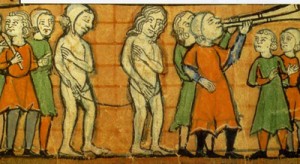By Dr Gwen Seabourne, Reader in Law (University of Bristol Law School).

For centuries, English common law saw married women as inferior to their husbands, disadvantaged in terms of legal rights and to be protected from themselves and from the outside world. Most formal legal disadvantages have been removed, so it might well be asked why modern lawyers should bother to look at the old laws.
One insight from history which is important for those working to consolidate gains already made and to make further improvements in the legal position of women is that there has been no straightforward, as-the-crow-flies, journey from oppressive medieval rules to enlightened modern ones. This comes out particularly in my recent work on the laws about adulterous wives [see G Seabourne, ‘Copulative complexities: the exception of adultery in medieval dower actions‘, in M Dyson and D Ibbetson (eds) Law and Legal Process: : substantive law and procedure in English Legal History (Cambridge, 2013), 34-55; and ibid, ‘Coke, the statute, wives and lovers: routes to a harsher interpretation of the statute of Westminster II (1285) c. 34’ (2014) 34(1) Legal Studies 123-42]. (more…)
